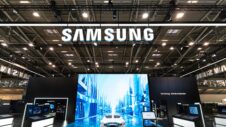Some people might have thought that Samsung had taken its eye off the ball with everything that happened since last year. There was the spectacular failure of the Galaxy Note 7 and a leadership crisis that landed the conglomerate's heir apparent behind bars in a corruption probe.
Despite all of that, the company's earnings guidance for the second quarter of this year suggested that it may become the world's most profitable technology company. Samsung has announced the Q2 2017 earnings today and sure enough, it has earned more profit in Q2 2017 than any other tech company on the planet.
Samsung reported 61 trillion won ($54.7 billion) as revenue for the quarter ended June 30, 2017, up 19.2 percent from the same time last year. The operating profit has surged considerably compared to Q2 2016. Samsung has posted an operating profit of 14.7 trillion won ($12.67 billion), an impressive 72.7 percent improvement compared to the same period last year.
The company has outperformed its own estimates that it released last month. Back then, it projected operating profit of 14 trillion ($12.1 billion) on 60 trillion won ($53 billion) revenue.
These impressive figures have made Samsung the most profitable tech company in the world this past quarter. This is also the first time that Samsung will overtake Apple in operating profit. Analysts expect Apple's operating profit for the quarter to come in at $10.55 billion.
As far as other tech companies are concerned, the four top companies which include Facebook, Amazon, Netflix and Google reported an operating profit of $11.15 billion in Q1 2017 combined. Samsung has earned more than the four of them put together in a single quarter. Samsung is now on track to break its annual profit record.
The company says that its components business was a major contributing factor behind the earnings growth in Q2 2017 both year-over-year and quarter-over-quarter. Strong demand for high-density DRAMs and SSDs for servers works in Samsung's favor.
The Display Panel Business was a big contributor as well as it expanded sales of flexible OLED panels for premium smartphones and high-value LCDs. The Mobile Business has been able to contribute more this past quarter primarily due to robust sales of the Galaxy S8 and the Galaxy S8+ but saw its operating profit margin decline slightly year-over-year due to strong component prices.







